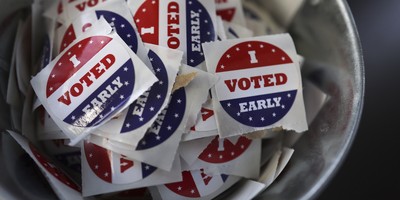It’s a common refrain from the victor: elections have consequences. The victor then goes on to claim a mandate to do A or Z. It’s par for the course. The real question is whether elections have consequences for the media. As it turns out, the answer appears to be yes.
On a whole host of issues, the mainstream media’s reporting seems to have a bit more balance, at least compared to the pre-election coverage of some of the campaign’s most important issues.
The left will dismiss this as conservative sour grapes, but ask yourself whether you saw, heard or read any pre-election stories about infighting among Democrats? If those stories do exist, they are few and far between and did not receive the attention given to the countless Republican against Republican stories.
Granted, some of this is the natural outgrowth of a grueling Republican primary and President Obama’s role as Party Unifier-in-Chief. Although the Democrats’ party discipline was good, substantial policy differences lurked just beneath the surface. Finally, two weeks after the election, the Washington-based media notices the divisions.
Politico opined, “Republicans may be reeling from their Nov. 6 drubbing, but Democrats have their own internal issues heading into the high-stakes talks — and they’re not insignificant.” On MSNBC, the Washington Post’s Chris Cillizza characterized congressional Democrats as having a “fractious coalition.”
This critique of the media goes beyond political characterizations, though, and extends into the policy realm. Take the issue of Medicare. Throughout the campaign, Republicans contended Obamacare’s $716 billion in Medicare cuts would hurt seniors because doctors would stop taking Medicare patients.
Recommended
Fact checkers ridiculed the claim. Take CBS. Not only did they say, “it's not the patients who would lose money. It's the providers,” but they claimed the cuts that were used to fund Obamacare would “actually make Medicare more efficient and extend the life of the program.”
Well guess what? Last week, we learned from Politico (again) that those cuts “have already begun sinking their teeth into health care providers.” The article quotes an insurance executive who explained the cuts, combined with Obamacare’s taxes, “could mean a significant reduction in benefits for seniors.”
How about those fact checks, fellas?
The questionable reporting even extended to the most important issue of the election: the economy. Endorsing President Obama for reelection, the Washington Post proclaimed the stimulus “helped restore confidence” in the economy and the stock market “reflects a recovery of the faith upon which every economy depends.” A mere three weeks later, once the election was decided, the very same Washington Post explained, “you’re not imagining it: This economic recovery has been a big disappointment...”
Even on Benghazi, there has been a subtle shift. To be fair, some in the media smelled a scandal from the outset and tried to ascertain what exactly happened on September 11, 2012. As the election neared though, that investigative fervor died down. No doubt Candy Crowley’s erroneous mid-debate “fact-check” contributed to that.
After the election, prompted by bizarre extramarital affair involving our now-former CIA director and his biographer, the media took a renewed interest in Benghazi. But not everything can be attributed to “the affair.” Liberal columnist Maureen Dowd quotes an unnamed administration official who said UN Ambassador Susan Rice “saw this as a great opportunity to go out and close the stature gap.” The official said Rice “was focused on the performance, not the content” when she appeared on five Sunday shows following the Benghazi attack.
On a series of issues, the media’s collective tone has shifted. The shift may be slight, but it’s noticeable. Would an honest conversation on the division amongst Democrats, Medicare, the economy and Benghazi have changed the outcome of the election? Maybe. Maybe not.
As others debate whether the media is responsible for President Obama’s reelection, one point is inescapable: the media is comprised of individuals with their own inherent biases. And it would be naïve for any of us to think those biases do not, at times, impact journalistic decisions.

























Join the conversation as a VIP Member